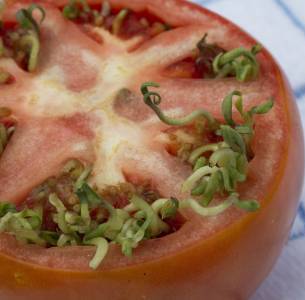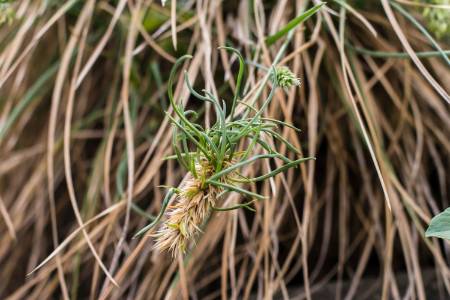Vivipary

Vivipary is a term originating in Latin that translates to “live birth”. In plants, vivipary is the germination of seeds without a rest period while the seed is still attached to the fruit. Vivipary is relatively common in apples and tomatoes. In plants, this can occur because of environmental factors or genetic mutations. Seed dormancy in plants is related to the levels of two plant hormones, Abscisic acid (ABA), which inhibits growth and seed germination, and Gibberellic acid (GA), which facilitates seed germination and cell elongation. These two hormones work in opposite ways in plants. Concentrations of ABA in plants are a direct response to moisture levels; the higher the moisture content, the lower the ABA levels will be, and the seeds may germinate while still in the fruit. When this happens in tomatoes and apples or other fruit, the fruit is still good to eat (don’t eat the germinating seeds of tomatoes, however, as they can cause stomach issues); it just may not look as appetizing as it normally would. As I said, this is not uncommon in tomatoes, apples, and several cereal grains (oats, rye, wheat, and corn), but this week is the first I have heard of vivipary happening in ornamental grasses. In nature, vivipary is an evolutionary advantage in certain climates, such as alpine areas with a short growing season or with mangroves, to ensure their offspring survive in a semi-aquatic tidal environment. In short, this process is fascinating and occurs in many different species of plants worldwide. Vivipary can occur in produce found in the grocery store, but it’s also as likely to occur in produce grown in your garden. If you haven’t seen a tomato similar to the photo yet, now you know what is going on when you find one in the future.
nature, vivipary is an evolutionary advantage in certain climates, such as alpine areas with a short growing season or with mangroves, to ensure their offspring survive in a semi-aquatic tidal environment. In short, this process is fascinating and occurs in many different species of plants worldwide. Vivipary can occur in produce found in the grocery store, but it’s also as likely to occur in produce grown in your garden. If you haven’t seen a tomato similar to the photo yet, now you know what is going on when you find one in the future.

Have questions? Contact our office where our Horticulture Extension Agent will assist you with questions.
Phone: (316) 321-9660
Email: callae@ksu.edu